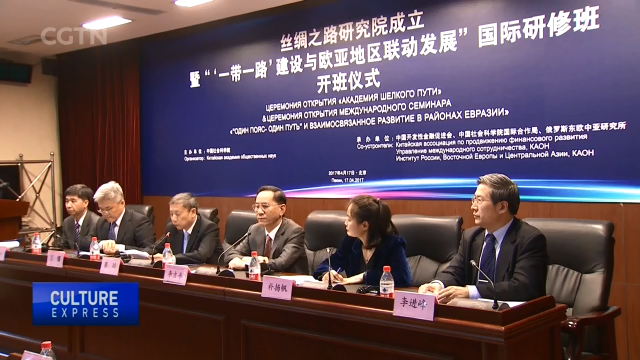
18:39, 15-Jun-2018
CASS High-Level Cultural Dialogue: SCO members actively participating in Belt & Road Initiative
02:18

The Chinese Academy of Social Sciences held a forum on Thursday in Beijing to discuss cultural ties on a person-to-person level. Most participants come from SCO countries and relevant organizations, to take a closer look at the Belt and Road Initiative. CGTN's Rory Coen has more.
The SCO Qingdao Summit just concluded. Yet the spirit of respecting cultural diversity and pursuing shared development continues.
WANG KAIWEN, DEPUTY SECRETARY-GENERAL SHANGHAI COOPERATION ORGANIZATION "SCO member states, observer states and dialogue partners total 18. Each of which has its own cultural traditions, ideas and values. Yet under the Shanghai Spirit, SCO countries have broad prospects for cultural collaboration."
Wang says SCO platforms help synergize the development strategies of relevant countries. While Shakhrat Nuryshev, Kazakh Ambassador to China, points out that cooperation should not be limited to the economy.
SHAKHRAT NURYSHEV KAZAKH AMBASSADOR TO CHINA "We could see a huge increase in economic cooperation between Kazakhstan and China in the coming years. I think it's important to hold cultural exchange events. I think cultural exchanges should be the basis of bilateral relations as well as people-to-people ties."
One organization -- the Silk Road Academy -- is attempting to do just that and has held three international workshops on Belt and Road construction and Eurasian development. Its Director, Li Jiping, says, think tanks and academics should provide a platform for practical activities.
LI JIPING, DIRECTOR SILK ROAD ACADEMY "The major task of our institute is to do research. Yet we cannot just write articles. We need to organize more exchange activities."
The Belt and Road Initiative focuses on five key areas of connectivity. Policy coordination, unimpeded trade, financial integration and facilities connection. While people-to-people bonds is crucial in the process of building a community of a shared future for all humankind, but an important one. Rory Coen, CGTN, Beijing.

SITEMAP
Copyright © 2018 CGTN. Beijing ICP prepared NO.16065310-3
Copyright © 2018 CGTN. Beijing ICP prepared NO.16065310-3